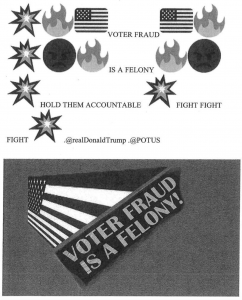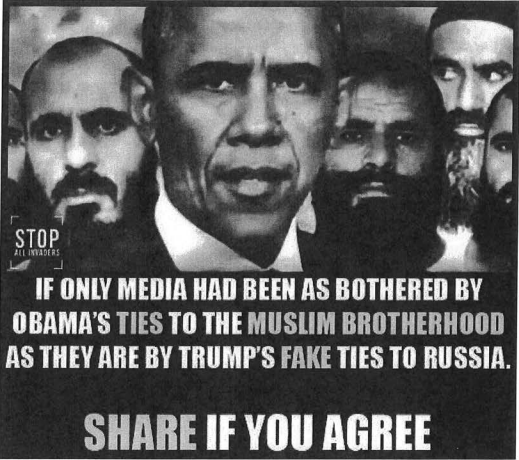Meet The Woman Who Is Proudly Russia’s Troll-In-Chief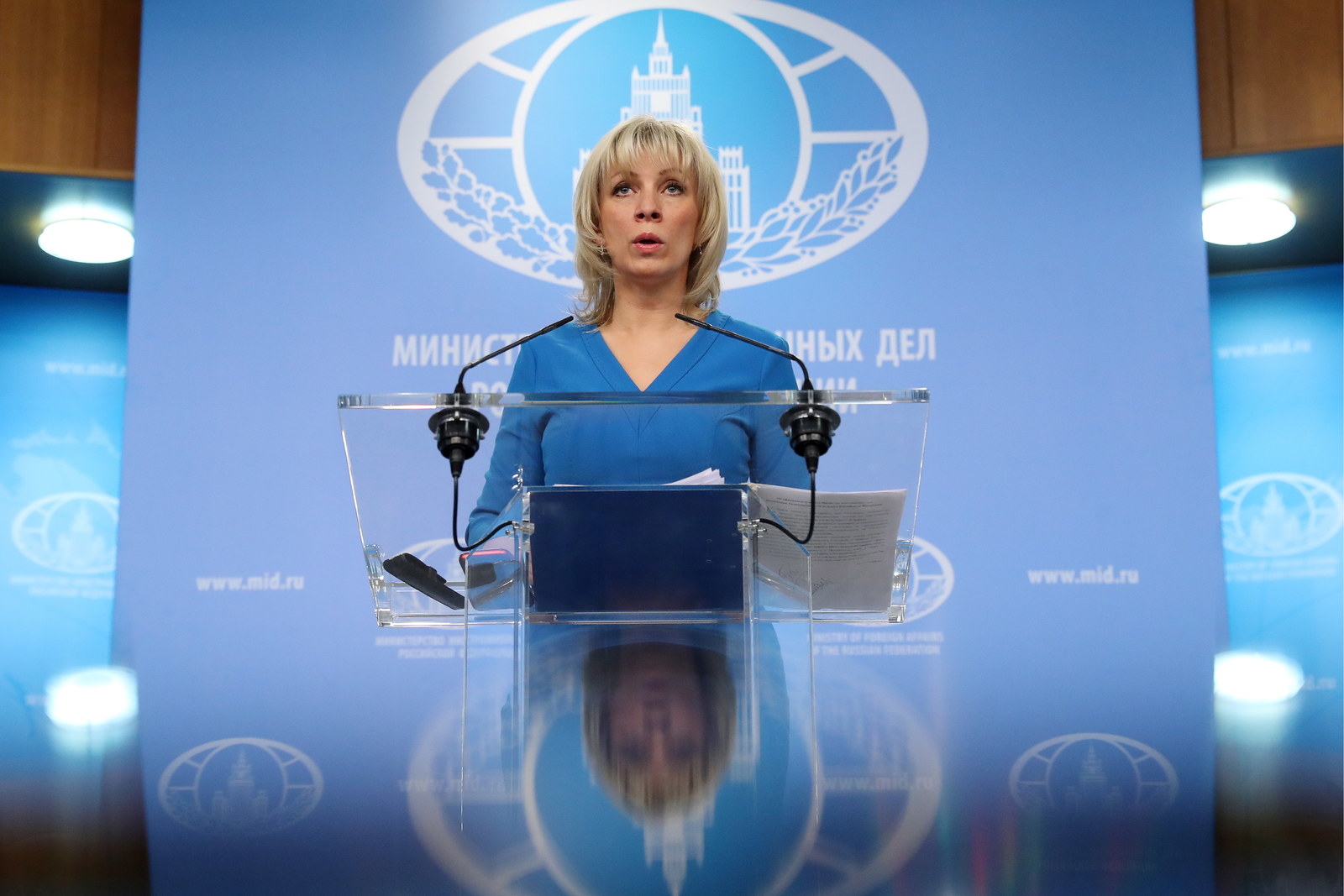
Maria Zakharova has revolutionized what it means to be a Russian diplomat — in real life and online. “She’s like Marmite: Some people love her and some people hate her.”
Konstantin Benyumov
Posted on October 22, 2018, at 6:10 a.m. ET
Vyacheslav Prokofyev / TASS
MOSCOW — In the years since Maria Zakharova took over the job of communicating Russia’s intentions to the wider world, her weekly press briefing has become must-watch TV here.
Combative and aggressive, her style mimicked Russia’s increasing belligerence, both at home and abroad.
One such briefing, in late May, exemplified the approach that has made her a star.
A journalist, Erkka Mikkonen of Finnish television, had dared to ask Zakharova, the Foreign Ministry spokesperson, about an anti-LGBT campaign unleashed in Chechnya by its ruthless leader, Ramzan Kadyrov, and unearthed when survivors began speaking to the press.
Zakharova stood at the lectern and responded with her usual calm irritation. Her answer would be watched almost 14,500 times on YouTube, aside from the journalists before her in the room at the time.
She addressed not Mikkonen, but the Chechen leader, who has been accused of widespread human rights abuses, including extrajudicial killing and torture: “Mr. Kadyrov, today’s briefing is being attended by a representative from Finnish television … Would you be able to organize a trip for him to the Chechen Republic during which he may be able to find the answers to the questions that so interest him?”
She then stepped out from behind the podium and approached Mikkonen, asking, “You’re not afraid, are you? I repeat: We are not joking here, we are actively working on sending you directly to Chechnya.” And then, almost imperceptibly, she winked at him.
The exchange was widely seen as a threat. Kadyrov is among the most feared people inside Russia, acting with brutality and impunity. That evening, he responded, telling the journalist: “Come down. Write about what’s really happening here. Journalists don’t seem to be pursuing objectivity very actively these days. Feels like there ought to be a competition, ‘Write the truth and win a free iPhone 7.’”
“It was very awkward and uncomfortable,” Mikkonen told BuzzFeed News’ reporting partner, Meduza, of the exchange with Zakharova. “It was like getting called out by the teacher in school. She was trying to make me feel like an idiot.”
Hers is an unapologetically confrontational approach that would make Donald Trump and Sarah Sanders envious. She was vilifying reporters and calling out supposed fake news before fake news was even a term. She exemplifies a time when Russia, feeling it had been shouted at for years, has been ready to shout back — loudly, fiercely, and with no room to question its line.
And, at the end of the day, even those she crosses call her successful. “Her goal isn’t making people feel good. She’s up there to spin everything in the way that’s advantageous for Russia,” said Mikkonen. “This is a very hard thing to do since very often, the official Russian line is actually very far from reality. Zakharova is pretty good at her job, though. For instance, when it comes to me, in the eyes of the Russian media, she won.”
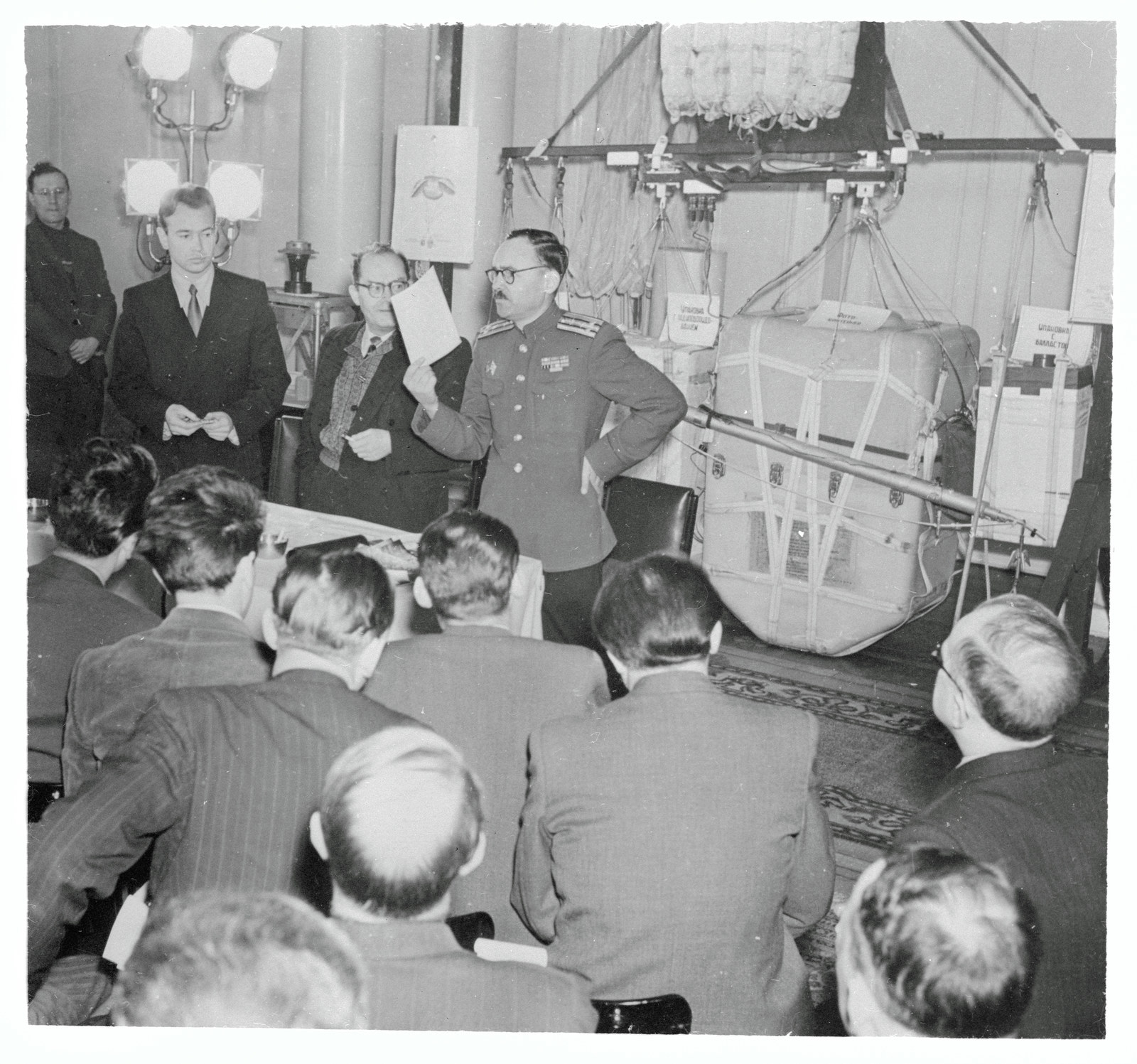
Soviet Army Col. A.V. Tarantsov at an elaborate press conference in Moscow, 1953.
Bettmann Archive / Getty Images
In Soviet times, press conferences held by the Foreign Ministry were routine and boring. As a rule, they featured serious men in suits — and they were always men — reading dry, official announcements, then answering questions using the same officious language. Those who ran the ministry’s Department of Information and Print saw it as a short stopover in their diplomatic careers as they worked toward becoming consuls or deputy ministers.
That remained largely true after the Soviet Union collapsed. And then came Maria Zakharova.
The 42 year old has completely upended the public face of Russian diplomacy. Gone are the dry statistics, replaced instead by bombastic language and off-color jokes. She is one of the few spokespeople in Russia known by name. Her briefings have also made her an online star, garnering millions of views on YouTube.
“She really likes her job. She clearly gets a kick out of what she does,” said Aleksey Maslov, a professor at Moscow’s prestigious Higher School of Economics, who was Zakharova’s academic adviser in the early 2000s. “She’s turned PR management for the Ministry of Foreign Affairs into high theater.”
Zakharova is seemingly everywhere — at the briefings, but also on TV talk shows and all over social media. On Instagram, it’s all lattes and flowers. Facebook is where she really shines, opining on everything from poetry to the ills of the West to her nearly 395,000 followers.
“She really likes her job, she clearly gets a kick out of what she does”
She doesn’t always stick to diplomatic protocol in her language. She once told a Ukrainian commentator on a talk show, “Let me speak or you will really hear what Russian missiles sound like!” She said the Barack Obama administration had no foreign policy accomplishments. When Obama’s secretary of state John Kerry advised students at a Harvard Kennedy graduation speech that, under the Trump administration, they should “learn Russian,” Zakharova pointed out that he himself had had two terms to have done so. She gave her opinion of Michael McFaul, US ambassador to Russia during the Obama years, especially bluntly, saying, “We remember his professional incompetence.”
A source close to the ministry called Zakharova “Russia’s answer to Jen Psaki.” Psaki, a State Department spokesperson under former president Obama, became target number one for trolling in Russian state media and official statements during her time in the post, as US-Russia relations began to plunge. Clips of her allegedly misspeaking went viral; her face appeared on mocking T-shirts in tourist hotspots.
If Russians were obsessed with Psaki, so, too, were they obsessed with comparing Zakharova to her. In 2015, Russia Insider, a pro-Russian site, ran an article under the headline, “Washington’s SpokesClowns Are No Match for Russia’s Top Press Spokeswoman.” After several paragraphs deriding Psaki, the article turns to Zakharova. “Sharp and witty, she runs circles around her US counterparts, and ordinary Russians get a kick out of her media appearances.”
Not all of Zakharova’s colleagues approve of her behavior. “When it comes down to it, she was threatening the journalist,” a source in the Russian government told Meduza regarding the incident with Mikkonen and Chechnya. “None of her predecessors would have taken such liberties.”
Maslov compared Zakharova to a talented lecturer to whom students flock even if she teaches a boring subject: They come for the performance. “It’s cathartic,” Maslov said. “At least you can come out of the theater, or one of Masha’s press conferences, and ask, ‘What the hell was that?’ Remember the other Foreign Ministry press secretaries? Of course you don’t.”
She has supporters and detractors inside the Russian government — as some sources told Meduza, she has two different groups of enemies within the agency: the “conservative men” and the “rationalists.” One group believes that she is too entertaining, a lightweight; the other that she is overdramatic.
“She’s like Marmite: Some people love her and some people hate her,” said a Russian diplomat currently working in the US. “However, [Foreign Minister Sergey Lavrov] is part of the first group, and that’s what counts.”
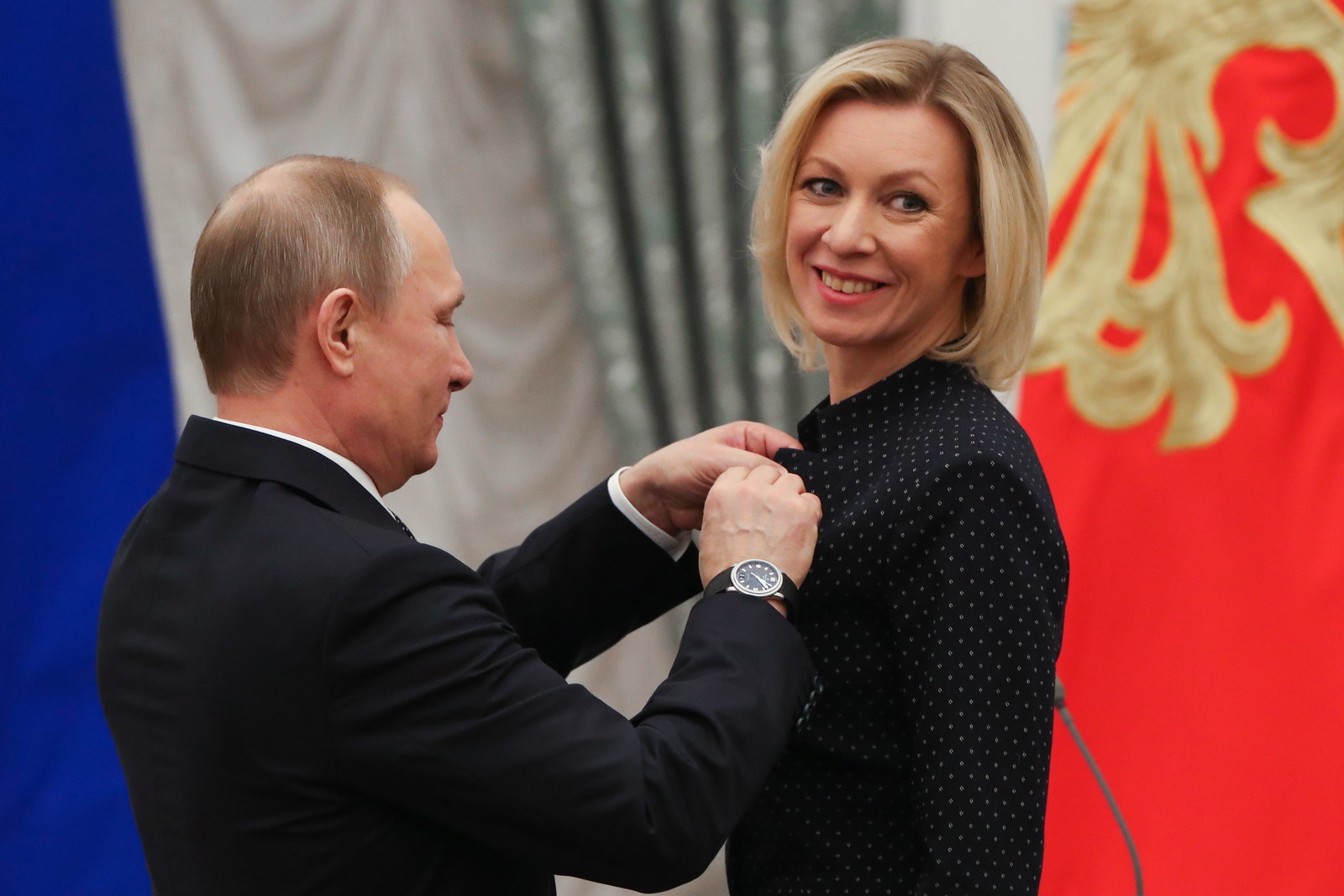
Russia's President Vladimir Putin awards Maria Zakharova with an Order of Friendship, during a ceremony at the Kremlin.
Zakharova comes from a line of diplomats. Her father, Vladimir Zakharov, moved the family to Beijing in late 1981 to work at the Soviet Embassy there. Zakharov devoted most of his career in China, first working at the embassy, then rising to the post of deputy secretary general of the Shanghai Cooperation Organization (SCO). “He knows Beijing and Shanghai better than he knows Moscow,” Maslov said, calling him “an absolute man of the system.”
In an interview with Meduza, Zakharova described the move, which came on her 6th birthday, as a “shock.” “Moving from snow-white and festive pre–New Year’s Moscow into a county that was gray, dusty, and horrifically cold — there’s no snow there, just wind. Everyone was wearing these homespun coats with sheepskin, and caps with red stars,” she said.
Zakharova is very close to her family — following in her father’s footsteps professionally and her mother’s footsteps in terms of temperament. Irina Zakharova is an art historian who works at Moscow’s famed Pushkin Museum, who, Maslov said, has a natural, “absolutely theatrical, emphatic exaltation.” “She’s the kind of museum worker who can look at any little shard and declare it extraordinary. Multiply Masha by three and you get her mother.”
“My parents were expecting a boy; the doctors swore up and down that they’d have one,” Zakharova said. “When they ended up with a girl, instead, I think my father didn't take me seriously. He loved me, he raised me, but his expectations were low. I didn't consciously realize that, but I think it left a mark on me.” This is why, Zakharova believes, she wasn’t surprised to find that women were often looked down on in the Russian professional world.
Zakharova said her parents harbored no illusions about the Soviet regime. In the early 1980s, Soviet journals had refused to publish Irina Zakharova’s articles about Chinese folk toys because of the state of Soviet-Chinese relations. There were incidents when her mother’s art books were confiscated at the border for allegedly containing pornography. Today, Zakharova calls these incidents mere “overreaches” by the Soviet system but acknowledges that during perestroika, she supported Mikhail Gorbachev.
“I believe it's important to see the pluses and minuses,” she said. “The fact that a giant state toppled, leaving behind, as the president has said, the largest divided nation, is a huge tragedy. And still, the things that Gorbachev lobbied for weren’t defeatist.”
The Zakharovs were in Beijing in 1991 when they learned of the fall of the Soviet Union. Life at the Soviet Embassy in Beijing grew difficult. No one was paid for long stretches; everyone was waiting to be evacuated. “We lived from month to month,” Zakharova recalled. “They said they would send an airplane, put everyone on it, and we would fly back. But to where? We’d come to Beijing with Soviet passports, now, we were going back to a completely new and confused country.”
But the family didn’t consider going anywhere else. The subject of emigration, she said, “was off the table. Our family is there, it’s our homeland, and not in an overblown, hysterical way, but as a simple fact. It’s home. We had to return to Moscow no matter what awaited us there. Although I remember that even the people closest to us told us not come back.”
The Zakharovs went back in 1993. Her parents had lost all their savings and had to survive on regular public sector wages, and meanwhile, the time had come for Maria to go to college.
Years earlier, in middle school, she told her mother that she was dreaming of becoming a diplomat or a foreign correspondent. Irina was alarmed. “She said, ‘You have to understand that neither path is open to you,’” Zakharova said. “In our country, they don’t have women diplomats or foreign correspondents.”
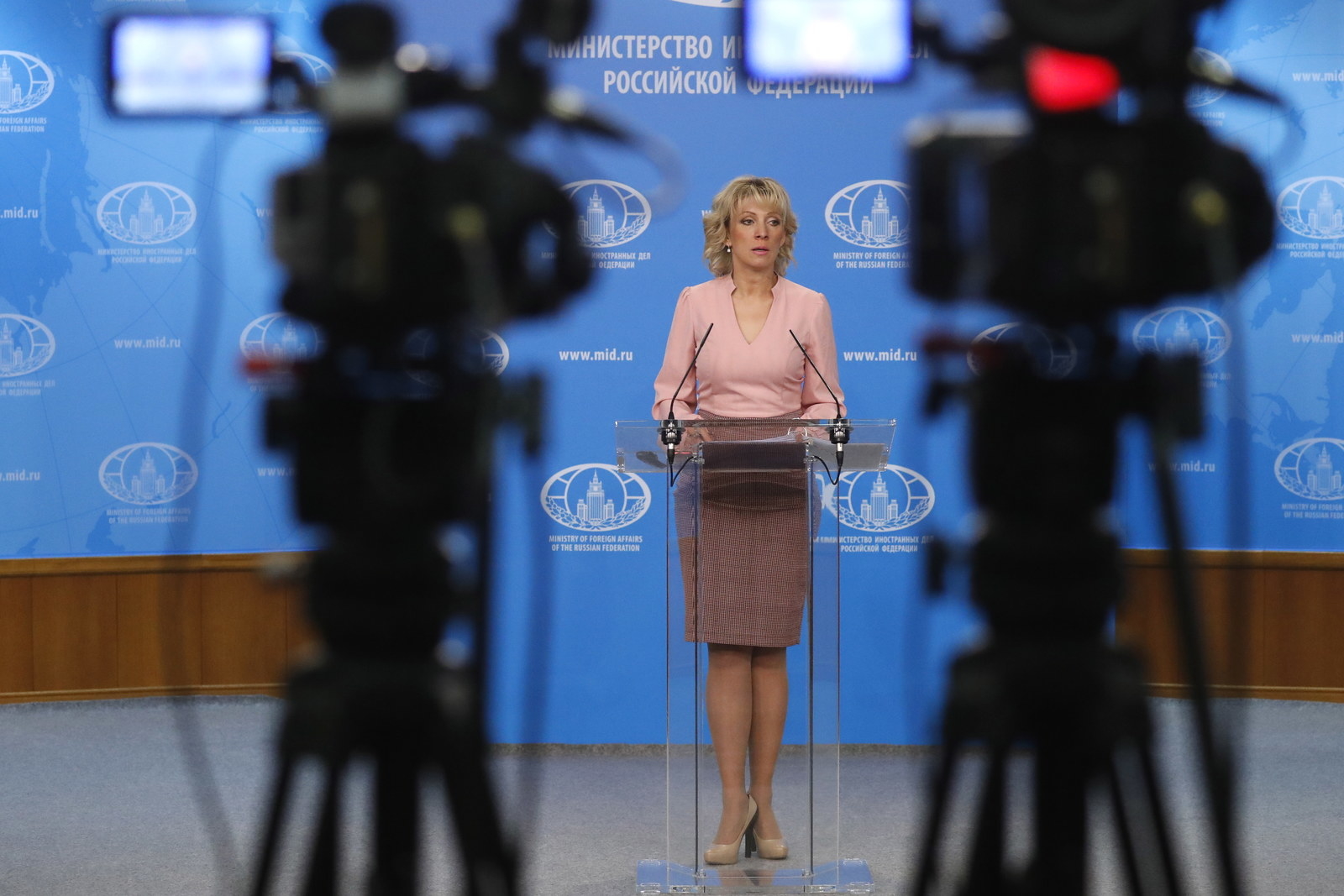
Maria Zakharova
Artyom Geodakyan/TASS
Zakharova entered the prestigious Moscow State Institute of International Relations (MGIMO) in 1993, as Russia was plunged into chaos by the collapse of the Soviet system and the sudden onslaught of capitalism.
“At that time, everyone was going into business,” Zakharova said. “I doubt that I would have gotten in before or after that exact moment.”
Maslov, her former adviser, saw it as a natural move. “Diplomacy has a clannish structure, because the most important thing about it is understanding and following the rules of the game, knowing what you’re supposed to do, and what not to do,” he said. “People rarely get into it from outside.”
Zakharova focused on China and graduated with honors in 1998 and, with recommendation letters from the country’s leading China experts, she applied for her first job at the Foreign Ministry, in its Asia Department.
She was not hired.
“It came as a real shock,” Zakharova said. “I had been working toward this for five years, I’d studied Chinese in school, I had an article published in Problems of the Far East. When they said ‘no,’ it was a full-on disaster.”
Zakharova scoured job fairs and was eventually recruited to join the federal tax service. Then, her connections took the lead. The Russian ambassador to China at the time, Igor Rogachev, had worked closely with Zakharova’s father. “He was in Beijing, but he somehow learned that I hadn’t been hired and I think through my parents suggested that maybe I could get into the press service,” Zakharova said. At the time, it was run by Vladimir Rakhmanin, who knew the Zakharovs well, having also worked at the Chinese Embassy. She joined the Foreign Ministry, as a press officer in its China Department, weeks after first being rejected.
Speaking to Meduza, Zakharova bristled at the idea that connections played a part — her answer giving insight into the new Russia, where things only get accomplished because of svyazi, or links. “What connections was I hired because of? What are you talking about?” she asked. “People got jobs at banks through connections, or at international corporations. At the Ministry of Foreign Affairs, with their $30-an-hour salary, they weren’t just hiring people — they were putting classified ads in the newspapers and one was answering.”
The greatest dream for an MGIMO graduate at that time, Zakharova said, was getting hired at international companies like Procter & Gamble or Philip Morris. Only people with ideological convictions went to the Foreign Ministry — or, those with nowhere else to go.
As Zakharova put it: She got the job because “fate once again interfered.”
Her first job at the Foreign Ministry was at the Diplomatic Bulletin, an intra-agency publication that mostly printed decrees, contracts, and archival documents, leaving only a little room for scholarly and journalistic articles on diplomacy. Zakharova took on the task mostly in hopes of eventually leaving for China. At the same time, she was studying her favorite culture in an academic setting — she had enrolled in graduate school at the Peoples’ Friendship University and, under Maslov’s supervision, began writing a thesis on Chinese folk holidays.
The subject was esoteric but, Zakharova believed, important. “My thesis might be mediocre, it might not be scholarly enough, but it's completely honest,” said Zakharova.
Around that time, in 2003, Zakharova crossed paths with Alexander Yakovenko, who would go on to head the Foreign Ministry’s press service (and eventually become the oft-tweeting Russian ambassador to the UK). She remembers running into him one day at MGIMO and sharing a cab to the vast Foreign Ministry headquarters back in the center of town. “We got to talking,” Zakharova said, and Yakovenko admitted that he didn’t understand a lot about information policy. She explained how she saw it and the new head of the Information Department asked her to put down what she had said on paper.
“I probably wasn’t entirely up to the task, but I realized that something big was happening — that this was my one chance to become an important part of this ministry,” Zakharova said. That night, she wrote a framework for the development of the ministry’s communication strategy, and the very next day, began her new job.
Zakharova saw her task as more than modernizing the ministry’s press service — she wanted to build it from the ground up. “The Soviet system of propaganda had stopped working, so there was nothing to destroy or change — we had to build something on completely different foundations,” she said. They looked to Western models, including US ones. Soon, the department stopped doing weekly briefings and focused on timely responses to media inquiries. They revamped the ministry’s website. Yakovenko started seeing journalists daily, reading them reports compiled from answers to their inquiries and participating in live broadcasts.
“Remember: Before that, the government didn’t hear and didn’t listen,” Zakharova said. “There were clans that had divvied up all the television networks. The government couldn’t even tell them, ‘Hey guys, we’re signing an important agreement right now, why don’t you at least pay some attention to that?’”
It was around the same time, in the early 2000s, that Zakharova met Sergey Lavrov, who would become foreign minister in 2004. The following year, Zakharova went on her first foreign assignment, to New York, to run the press service of the Russian mission to the United Nations, where Lavrov had been UN ambassador before being promoted to foreign minister. “The Russian Permanent Mission had always been [Lavrov’s] territory,” a source inside the Russian government told Meduza. “Everyone there is fairly close to him. And if that’s where Maria was, it means that by that time, they must have already been on good terms.”
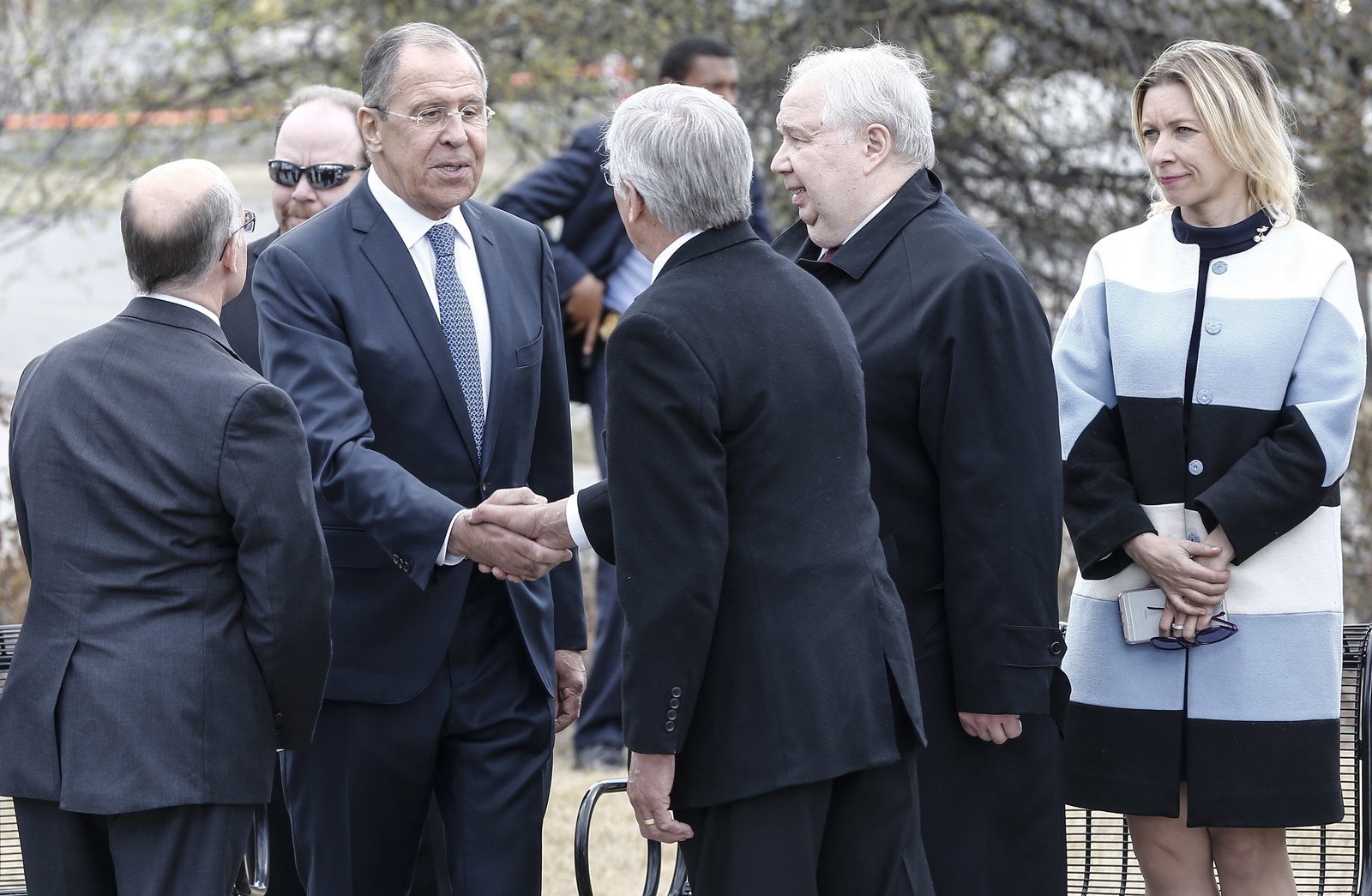
From right to left: Foreign Ministry spokesperson Maria Zakharova; former Russian ambassador to the US Sergei Kislyak; former lieutenant governor of Alaska Byron Mallott; and Russia's Foreign Minister Sergei Lavrov talking after laying a wreath at the Alaska Siberia Lend-Lease Memorial, featuring statues of US and Soviet pilots.
Alexander Shcherbak / TASS via Getty Images
From right to left: Foreign Ministry spokesperson Maria Zakharova; former Russian ambassador to the US Sergei Kislyak; former lieutenant governor of Alaska Byron Mallott; and Russia's Foreign Minister Sergei Lavrov talking after laying a wreath at the Alaska Siberia Lend-Lease Memorial, featuring statues of US and Soviet pilots.
Zakharova arrived in New York with false expectations of life in the West.
“I left [for New York] in 2005 with, of course, rose-colored glasses, that’s for sure,” Zakharova said. “I think I just left with a hypercritical view on our reality,” she said, “but most importantly — with heightened expectations about the ideals that waited for me there.”
It took one closed session of the UN Security Council to change her mind. “The same people who talk about human rights in public easily toss around human lives behind closed doors,” she said. “I was not ready for all that, for the cynicism and roughness. There are no higher values at play, only the same kinds of interests people will fight over until the bitter end.”
Zakharova spent the next three years in New York, traveling from the Permanent Mission complex, 20 miles outside the city, to make it to work at UN headquarters by 9 a.m. and then work until nearly midnight. Zakharova said she still loves the city — and posts giddily whenever she has visited since — but no longer has “any illusions about the [US espousing] higher ideals and humanist values.” Among other things, the spokesperson says she was bothered by the fact that American journalists never wrote anything good about Russia — they were, she said, only interested in crime, terrorism, and corruption.
Those who knew Zakharova at the time don’t recall her voicing these opinions — which have hardened into the anti-Western vitriol she regularly espouses from the podium and in the media. Zakharova was at the UN four years after George W. Bush looked into Vladimir Putin’s eyes and said he had gotten a sense of his soul. During her tenure, Putin may have been consolidating power and centralizing authority, but US–Russia relations were still relatively good. There were signs of deterioration — including Russia’s war with Georgia, but most people weren’t speaking of a new Cold War.
“When Sergey Lavrov worked at the UN, he seemed like a completely different person,” said Matthew Rojansky, director of the Kennan Institute at the Woodrow Wilson International Center for Scholars. “He was a mainstream Russian diplomat. It’s important to understand that at that time, both he and Zakharova were working under a completely different administration.”
Zakharova’s career really took off under the presidency of Dmitry Medvedev. Medvedev, who stepped into the role of president between Putin’s second and third terms, very much modeled himself after his US counterpart at the time — Obama. Medvedev wanted to portray himself as modern, liberal, and tech-savvy; Obama professed to want improved relations between the United States and Russia.
It was in this context that Zakharova met another influential woman in Russian politics, Natalya Timakova, who was Medvedev’s press secretary, until she left the role last month. Zakharova’s professionalism and her understanding of the media impressed Timakova. She liked how Zakharova didn’t hide behind formal announcements and wasn’t afraid to express her own opinions. “As it was fashionable to say back then, she was very ‘proactive,’” Timakova told Meduza. Timakova said she convinced Lavrov to promote Zakharova “out of a desire to support another smart woman.”
A source close to the government said that without this support, it is unlikely that Zakharova would have ascended as she did. That is in no small part because the Foreign Ministry is known as the most sexist government body in Russia. The number of women consuls can be counted on one hand; Zakharova is the only woman to head a department at the Foreign Ministry. Of all Russia’s current ambassadors around the world, only one is a woman (Lyudmila Vorobyeva, responsible for representing Russian interests in Indonesia, East Timor, Papua New Guinea, and Kiribati), although another is an ambassador-at-large (Eleonora Mitrofanova, who covers world heritage issues at UNESCO).
Zakharova doesn’t see herself, however, as a trailblazer. Her views on women’s equality fall in line with the Russian mainstream — highlighting what are seen as the good differences between men and women, the righteousness of traditional gender roles, and the hysteria of the feminist movement in the West.
“The French Foreign Ministry has to be 50/50 men and women, whatever it takes! Take them off the street, grab them from the stores — it doesn’t matter,” she said. “We have never had quotas or any other kind of obligations. But the people who have gotten into the highest positions have done it based on their abilities, and not thanks to quotas.”
When Zakharova thinks of the fight for women’s rights in the US, she thinks of high heels. She recalled her first visit to the country, as part of an official Foreign Ministry delegation, in 2004, when she decided to spend three free hours at the National Gallery in Washington, DC. “Obviously, I went in heels,” she said. “It’s the National Gallery!”
She recalled having to walk several miles in her heels to the museum, and then inside. But she felt her plight was rewarded when she was approached by an older security guard at the museum, who said: “Madam, I would take everything out of this gallery and leave your high heels in the center. I am so sick of watching people in sneakers, especially women in these terrible, formless shoes.” Zakharova called the moment transformative. “I understood it was a symbolic phrase, but how this world is turned upside down — how many suffer!” In the guard’s confession, she heard a longing for times when women could be feminine and men still had the right to pay them compliments.
Zakharova believes that gender relations in the US and the fight against sexism are categorically wrong. She sees the situation in Russia as healthier — women have rights, she said, and would continue to occupy ever higher positions at work, while “a gallantry, that is part of our tradition” remains in force. “I think that if a woman is carrying a heavy bag and a man is walking next to her, he should offer to carry it,” Zakharova said. “If a woman wants to go through a door, the door should be opened for her.”
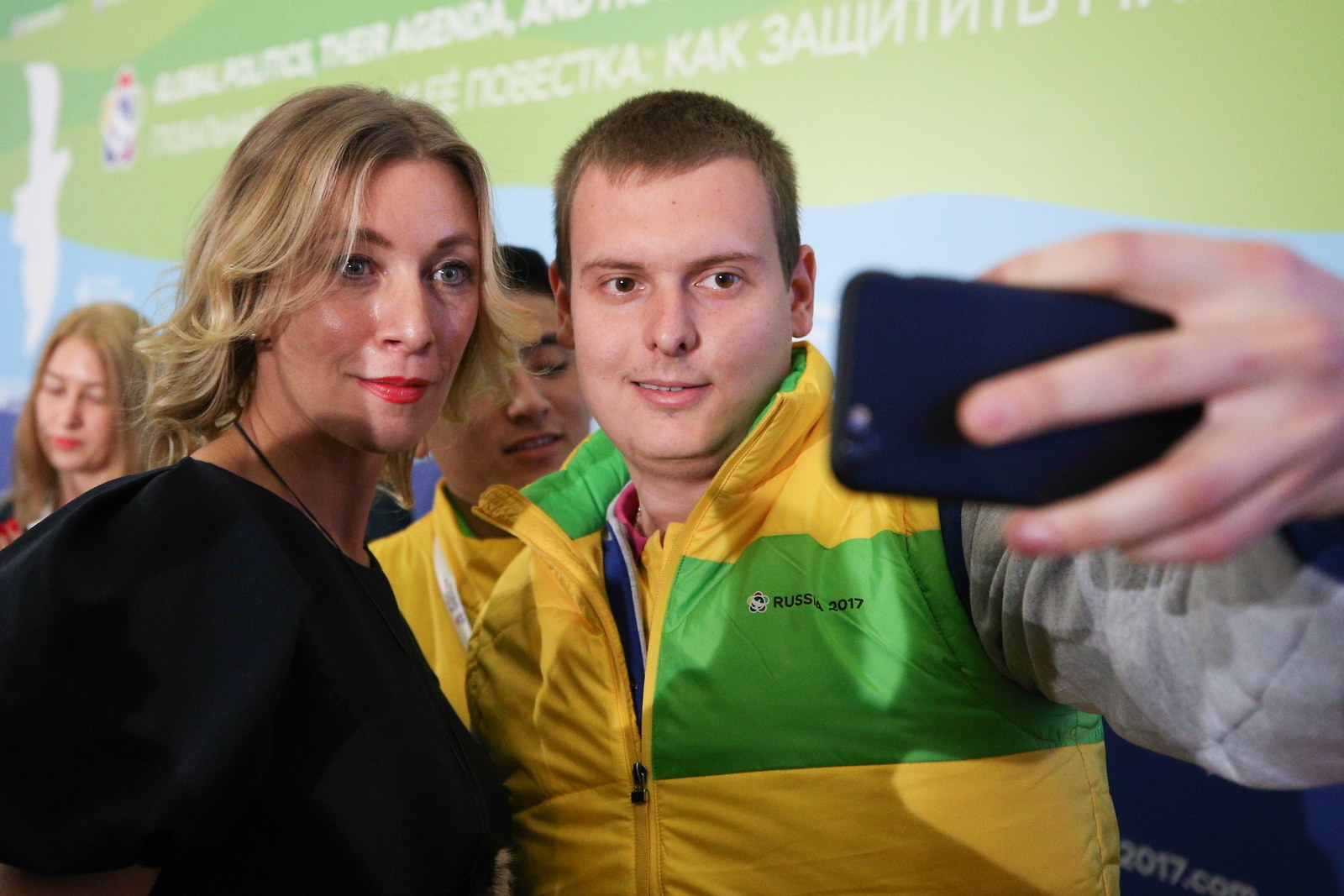
Zakharova (left) poses with participants in the Olympic Park's main media center in Sochi.
As her posting in New York drew to a close, Zakharova had a few options. “But I knew that what I wanted to do was take everything I had learned back to my own country and apply it there,” she said. But back in Moscow, at the Foreign Ministry headquarters, there was no similar sense of a mission. It was 2008, and the ministry seemed unprepared for the modern age — no one understood why, for example, social media was important.
Zakharova was different.
“We had a lot of conversations about social media sites and incredibly, Maria had no idea how they worked,” Mikhail Zygar, a journalist who worked at Kommersant at the time, told Meduza. Zygar says he taught Zakharova how to use Facebook when she came back to Moscow.
In 2011, Zakharova became the deputy director of the press department, responsible for organizing briefings, visits abroad, and running the Foreign Ministry’s social media accounts. It was a huge move for Zakharova — and one that put her front and center for the first time. Zakharova personally transformed herself accordingly. She went on a training kick, preparing herself to look as well as act the part of the face of Russian foreign policy.
“Masha approached it very methodically,” a source told Meduza. “She started going to the gym, she hired a personal trainer who established her diet and fitness regimen, she changed the way she dressed.”
“It’s not that she had to do any of those things,” another source said. “But she knew that she would be representing the country and that she would be on TV. I really respect her for that.”
Zakharova also totally reimagined what Russia looked like online. Suddenly, the Foreign Ministry launched a Twitter account, which promoted Russia’s image and vigorously defended its point of view. In the West, the account — like Russian Embassy accounts around the world — gained a reputation for being aggressive and loose with the facts. On April Fools’ Day in 2013, the main Foreign Ministry account changed its name to “MFA Trolls,” a spoof on their growing reputation. A year later, the department won a “Runet,” or Russian internet, award in the “Culture, Media, and Mass Communications” category. It was presented to Zakharova at an official ceremony.
The aggressive posturing online coincided with an equally bellicose Russian foreign policy. In 2013, then-Ukrainian president Viktor Yanukovych backed out of a deal with the European Union under pressure from the Kremlin. A revolution in Ukraine followed, which Putin blamed on the US, before he swiftly annexed Crimea from Ukraine following a referendum, which was widely criticized as illegitimate and which Russia maintains was in accordance with international law. The Kremlin was also involved in the armed conflict in Eastern Ukraine, where fighting continues to this day. The next summer, in July 2014, Malaysia Airlines Flight 17 was downed over separatist-controlled territory. International investigations have established it was shot down by rebels with weapons provided by Russia. Russian activity in Ukraine, at least as determined by Washington, brought on sanctions from the US and EU, and Russia’s political isolation from the West, buoyed by its deployment of forces to Syria to support Bashar al-Assad.
Zakharova met each turn with online jokes and social media-ready soundbites, but under every jab was a deeply serious message — she and the ministry would laugh at, not accept or internalize, criticism of Russian foreign policy.
That has only grown over time. Since Russia was accused of meddling in the 2016 US election, and the word “troll” has become almost synonymous with Russia, the Foreign Ministry has only played to type.
Zakharova is clearly proud of the Foreign Ministry’s sense of humor. Their online April Fools’ jokes have become a tradition. In the middle of her interview with Meduza, Zakharova whipped out her phone to read one of her favorite jokes, a recording of which was released on the Foreign Ministry Twitter account on April 1 last year. “Hello. You’ve reached the Russian Embassy. If you wish to have a Russian diplomat speak to your political enemies, press 1; if you would like to use the services of Russian hackers, press 2; if you have any questions about election interference, press 3 and wait for the beginning of a political campaign. To ensure the quality of our services, all phone calls will be recorded.”
“That’s totally Masha. She’s being provocative, of course,” Elena Chernenko, an editor at Kommersant who knows Zakharova well, said. “All of these jokes — that’s what she’s really like. That’s how she jokes around in private.”
Being provocative has also served her well professionally. For those at Zakharova’s level in Russian politics, Rojansky said, “you have every incentive to try to elevate or preserve your status. One of the most obvious ways of doing that is trying to pick fights.” And Zakharova proved herself skilled at picking fights with the most powerful, biggest bully of all: the United States of America.
Her undiplomatic, sarcastic approach has won her many detractors in the West — “I have no idea why she remains so obsessed with me,” McFaul wrote of her personal attacks in an email to BuzzFeed News, adding, “But she does seem obsessed” — but Zakharova admits that a lot of her work is aimed at the domestic Russian public. She believes that the most critical element of her job is the opportunity to speak with people directly and that the language that comes out of the MFA needs to be geared toward its intended audience. “Today, it’s not just the media you need to talk to.”
Her willingness to engage — even combatively — has won her some fans in the Russian media. Accustomed to impenetrable ministries and officials who act like the press is a toxic force to be avoided, Zakharova is at least someone they can speak with. She will unleash a torrent of criticism and vitriol — but then she will reply.
Alexander Gabuev of the Carnegie Moscow Center, who worked closely with Zakharova when he was a journalist for Kommersant, said the first thing she does when a journalist asks for a comment is find out their deadline. This practice, which is standard in the West, is still unimaginable in the majority of Russian government agencies. “She isn’t some career diplomat with no conception of how media works,” Gabuev said.
Journalists also give Zakharova her dues for working with all kinds of media outlets, including independent ones — which are therefore considered part of the “opposition” to Putin. While this may be standard practice in the US, it is rarer in Russia, and appreciated by even those normally critical of the Kremlin and government. “She never asked for questions to be approved ahead of time and always let me speak without knowing what I was going to ask,” said Anton Zhelnov, who has worked the Foreign Ministry press pool for the independent TV channel Rain.
“She’s like Marmite: Some people love her and some people hate her"
“I very often disagree with the things Masha says publicly and in her personal conversations with journalists, but I like arguing with her because she tries to convince you, but also listens to your arguments. She doesn’t just say, ‘That’s it, you’re wrong, forget it,’” said Chernenko, who has developed something of a friendship with Zakharova. “She is willing to have real conversations that show that she’s truly interested in talking to you. There are not many officials who do that.”
Zakharova recalls how, on one occasion, she was having a heated argument with journalists aboard a Foreign Ministry flight shortly after Russia annexed Crimea. The journalists believed that Russia had acted in violation of international law; she didn’t. “It was a long flight, and we got to the point where we were all shouting: They were yelling at me, and I was yelling back at them,” Zakharova said. “It wasn’t just about Crimea; we were talking about things like #MeToo. After these kinds of incidents, I always approach people, or call them, or write to them, and do what I can to let them know that I got too emotional or personal and crossed a line. And people apologize back.”
Maxim Martemyanov traveled with the Foreign Ministry pool in 2014 and 2015 while writing a profile of Sergey Lavrov for Russian GQ. According to him, Zakharova “jealously guarded the minister,” making sure that no “human” detail about his personality appeared in the press. “It seemed like she was not only running the MFA press service but also acting as Lavrov’s personal PR manager,” he said.
“Masha is very personable — on the plane and at events,” said Martemyanov said. “But if you cross the line, she goes into angry headmistress mode.”
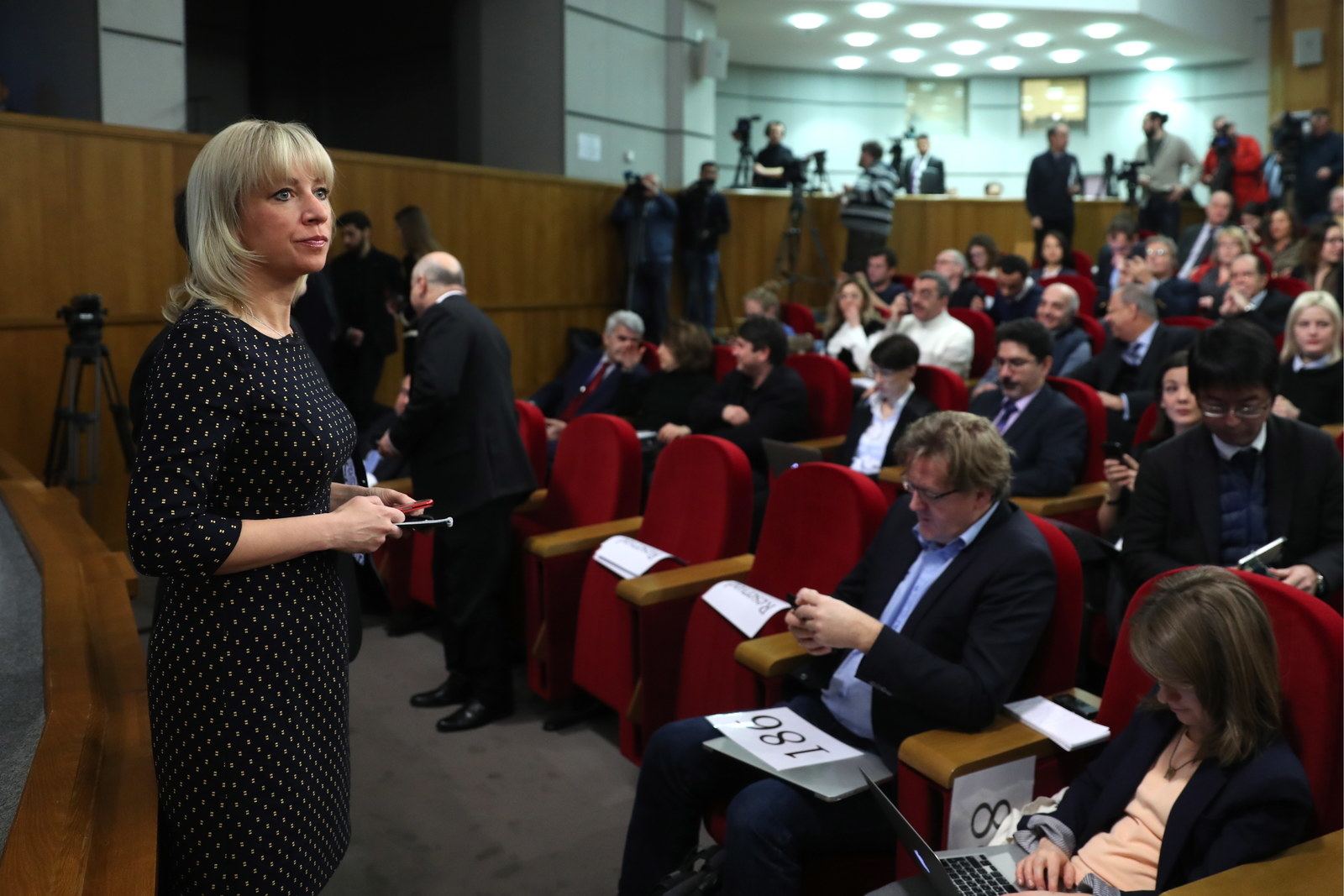
Zakharova, ahead of a press conference by Foreign Minister Sergei Lavrov on Russia's foreign policy in 2017.
For some who know her, it’s hard to tell how much Zakharova is a true believer in the policies she pushes and how much of it is merely fulfilling her public role.
Andrei Kozyrev, a former foreign minister who has been living in the US for many years and is now a Putin critic, says he knows two Zakharovas — the one he met in the US in the mid-2000s, well before the invasion of Crimea, and the person she has become since then. “For me, this is a very painful subject because after Crimea, my comrades, talented diplomats who had been involved in promoting my more or less pro-Western policies, started saying completely monstrous things,” he said.
Russia’s annexation of Crimea and meddling in eastern Ukraine were a turning point — both for Russia and how it was viewed in the world. And it was a turning point for Zakharova. When they met, Kozyrev said, “Maria made a very good impression on me: She was very polite, professional, and helpful. It’s painful to see people afflicted with a political plague.”
“It’s hard to say what Masha really thinks about Crimea,” said the journalist Martemyanov, referring to her by her nickname. “But of course, in public, she can only say things that are in line with the policies of the president. [The diplomats] don’t make the decisions; they only justify them to the world community. That’s the discipline of diplomacy. It’s very possible that they don’t believe in anything at all.”
It was hard to tell when Meduza sat down with Zakharova (after a prerequisite text from her that read, “Are you planning on writing nasty things?”) at a Starbucks near the Foreign Ministry building. She spoke for four hours over two days.
Zakharova didn’t prescreen the questions, but there were subjects that she wouldn’t talk about. She doesn’t comment on domestic Russian policies because she considers it “bad manners to publicly talk about things that you’re not an expert on.”
She spoke about her parents and child (she has an 8-year-old daughter), but never about her husband, a man named Andrei Makarov, whom she married in 2005 in New York and about whom almost nothing is known.
She spoke a little about her poetry — in recent months, she has written a poem about a Russian pilot shot down in Syria and cowrote a song with Russian pop star Katya Lel.
“I was reacting to current events and that was the form my reaction took,” Zakharova said. “I don’t write poetry. I want everyone to know that. [Anna] Akhmatova, [Bella] Akhmadulina, they wrote poetry. I am just making rhymes. It’s a typical Russian amusement. Just like how ladies used to sew — they weren’t seamstresses, but they embroidered.”
Sources close to the government consider all of this show business — additional efforts toward theatricality on the part of Zakharova, whose task is to increase how often she is quoted in the press. “In the past, spokespeople didn’t have to mug for the cameras and draw attention to themselves,” said one former government official. “But politics have changed dramatically, and today, spokespeople act like they’re the important ones.”
“Our diplomacy is rather dry and Maria has breathed a lot of new life into it,” the former official said. “On the other hand, diplomacy is supposed to be dry and boring, and so it’s a big question how much scathing retorts and flashiness do for it.”
According to Maslov, her former adviser, Zakharova’s success is the result of her finding herself in the right place at the right time — just when the Russian government needed an interesting character to represent its foreign policy. “Maria Zakharova has, inarguably, made her mark,” he said. “She embodies the new stage of the development of Russian diplomacy. When this stage is over, they might get rid of the interesting characters altogether.”
“She is far from stupid and knows very well that she is dancing on a minefield,” he said. “So far, the Lord has protected her from explosions. But the worst thing would be if this talented person turned into a boring Foreign Ministry worm. She might rise up to a very high position, but if she loses her charm, she will be a lot less interesting. The artist only matters while she is making art.”
Alberto Nardelli contributed reporting to this story.
https://www.buzzfeednews.com/article/ko ... n-ministry 

